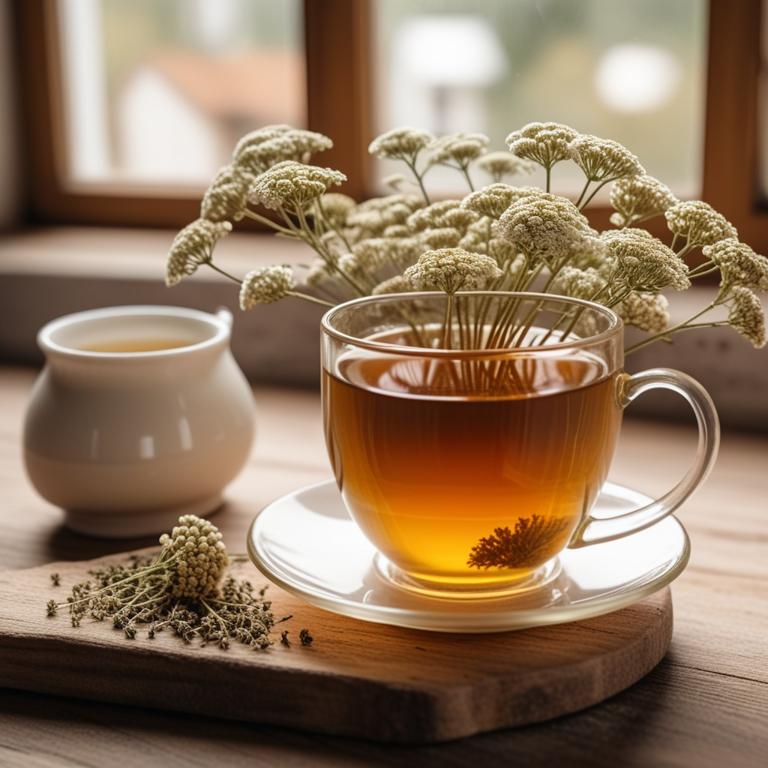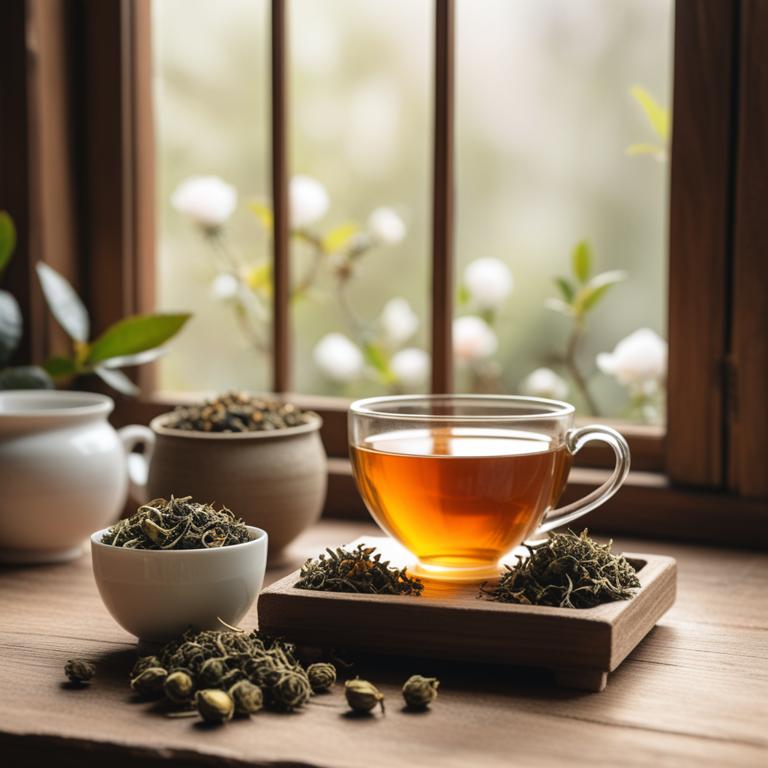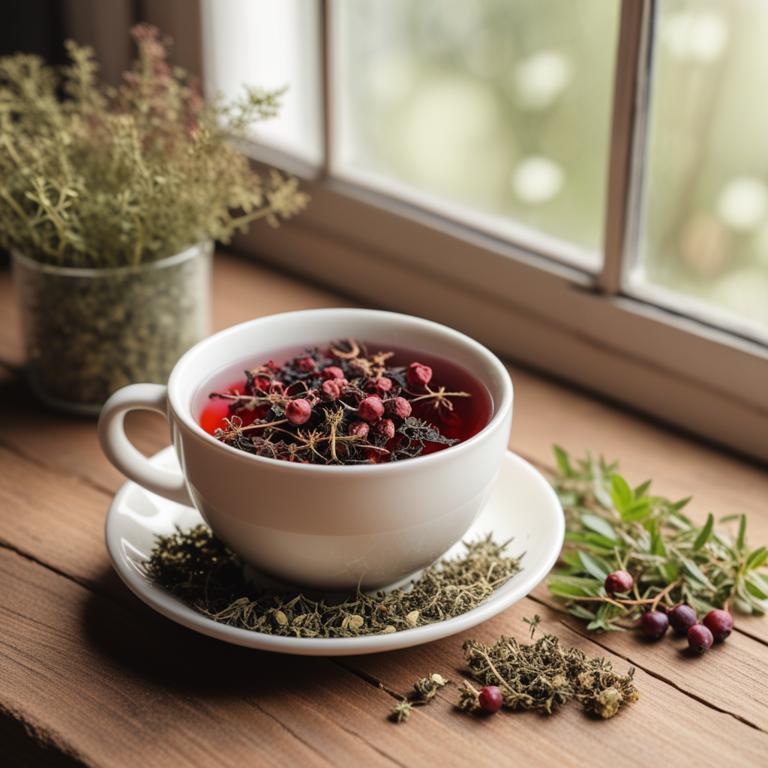9 Best Herbal Teas For Inflammation

Herbal teas for inflammation are natural remedies made from various herbs, plants, and flowers that are used to reduce and alleviate inflammation in the body.
These teas have been used for centuries to treat various inflammatory conditions, such as arthritis, gout, and other inflammatory diseases, by providing anti-inflammatory properties and antioxidants that help to calm and soothe the body.
Examples of herbal teas that are commonly used to treat inflammation include ginger tea, which reduces pain and inflammation, turmeric tea, which contains curcumin that has potent anti-inflammatory properties, peppermint tea, which reduces inflammation and relaxes the muscles, chamomile tea, which soothes and calms the body, and willow bark tea, which contains salicin, a natural anti-inflammatory compound similar to aspirin.
By incorporating these herbal teas into your daily routine, you can potentially alleviate symptoms of inflammation and enjoy the benefits of a healthier and more balanced lifestyle.
According to "Journal of medicinal food", teas for inflammation may be a safe alternative to traditional medications, as herbal teas such as laurel tea have been found to exhibit significant anti-inflammatory activity and inhibit the major signal transduction pathway responsible for inducing an inflammatory event.
Below there's a list of the 9 best herbal teas for inflammation.
- 1. Curcuma longa teas
- 2. Camellia sinensis teas
- 3. Zingiber officinale teas
- 4. Rosa rugosa teas
- 5. Vaccinium macrocarpon teas
- 6. Ginkgo biloba teas
- 7. Echinacea purpurea teas
- 8. Silybum marianum teas
- 9. Cinchona officinalis teas
Also you may be interested in...
TODAY'S FREE BOUNDLE
Herb Drying Checklist + Herbal Tea Shopping List + Medicinal Herbs Flashcards
Enter you best email address below to receive this bundle (3 product valued $19.95) for FREE + exclusive access to The Aphotecary Letter.
$19.95 -> $0.00
1. Curcuma longa teas

Curcuma longa teas, derived from the turmeric plant, have been used for centuries to treat inflammation-related ailments due to their potent anti-inflammatory and antioxidant properties.
The bioactive constituents, such as curcumin, demethoxycurcumin, and bisdemethoxycurcumin, in these teas help to reduce inflammation by inhibiting the production of pro-inflammatory enzymes and cytokines.
By consuming Curcuma longa teas, individuals can benefit from reduced joint pain and swelling, improved immune function, and enhanced overall well-being.
Regular consumption of these teas has been shown to be a natural and effective way to manage chronic inflammation, making them a popular herbal remedy for various inflammatory conditions.
Related Study
According to "European journal of medicinal chemistry", Curcuma longa teas for inflammation have been reported to have a long history of use and effectiveness, with multiple clinical trials highlighting their health-promoting and disease-preventing attributes, particularly in relation to reducing inflammation.
2. Camellia sinensis teas

Camellia sinensis teas, which are derived from the leaves of the Camellia sinensis plant, have been traditionally used to treat inflammation and its related ailments due to their potent anti-inflammatory properties.
The bioactive constituents present in these teas, such as flavonoids, polyphenols, and theaflavins, help to reduce inflammation by inhibiting the production of pro-inflammatory enzymes and cytokines.
By consuming Camellia sinensis teas, individuals can experience relief from inflammation-related symptoms, including reduced swelling, pain, and redness, as well as improved overall well-being.
The benefits of using Camellia sinensis teas to treat inflammation include reduced risk of chronic diseases, such as arthritis and cardiovascular disease, as well as enhanced antioxidant defenses and immune system function.
Related Study
According to the study on Camellia japonica, Camellia sinensis teas have anti-inflammatory properties due to the presence of bioactive ingredients such as phenolic compounds, terpenoids, and fatty acids that act as anti-inflammatory agents.
3. Zingiber officinale teas

Zingiber officinale teas, derived from the rhizome of the ginger plant, have been traditionally used to treat inflammation-related ailments due to their potent anti-inflammatory properties.
The bioactive constituents, including gingerols and shogaols, help to inhibit the production of pro-inflammatory enzymes, thereby reducing inflammation and alleviating associated pain.
The consumption of Zingiber officinale teas has been found to benefit individuals suffering from conditions such as arthritis, as they help to reduce joint pain and swelling, promoting overall well-being and mobility.
Regular consumption of Zingiber officinale teas can lead to improved quality of life, reduced reliance on pharmaceuticals, and a decrease in the risk of chronic inflammation-related diseases.
Related Study
According to "Journal of ethnopharmacology", Zingiber officinale teas for inflammation may provide anti-inflammatory benefits as evidenced by a reduction in carrageenan-induced paw swelling in rats.
4. Rosa rugosa teas

Rosa rugosa teas have been traditionally used to treat inflammation, a condition characterized by redness, swelling, and pain in the affected area.
The anti-inflammatory properties of this herbal preparation are attributed to the presence of bioactive constituents such as flavonoids, phenolic acids, and triterpenoids, which help to reduce inflammation by inhibiting the production of pro-inflammatory enzymes.
Rosa rugosa teas have been shown to help treat inflammation by reducing the severity of symptoms, such as pain and swelling, and promoting the healing process.
The benefits of using Rosa rugosa teas to treat inflammation include their ability to reduce oxidative stress, prevent tissue damage, and promote overall well-being, making them a valuable natural remedy for managing this common ailment.
Related Study
According to "Biomolecules & therapeutics", Rosa rugosa teas for inflammation have been found to significantly inhibit the production of various inflammatory mediators, including nitric oxide, prostaglandin E2, tumor necrosis factor-alpha, and interleukins, thereby proposing therapeutic potential in the prevention of inflammatory disorders.
5. Vaccinium macrocarpon teas

Vaccinium macrocarpon teas, also known as cranberry teas, have been traditionally used to treat inflammation ailments due to their anti-inflammatory and antioxidant properties.
The anthocyanins, flavonoids, and phenolic acids present in these teas help to reduce inflammation by inhibiting the production of pro-inflammatory enzymes and cytokines.
This herbal preparation works by scavenging free radicals, reducing oxidative stress, and modulating the immune response, thereby alleviating symptoms of inflammation.
The benefits of Vaccinium macrocarpon teas in treating inflammation ailments include reduced pain and swelling, improved joint mobility, and enhanced overall well-being.
Related Study
According to the given study, Vaccinium macrocarpon teas for inflammation have anti-inflammatory properties due to the presence of phytoconstituents that can prevent undesirable inflammatory processes and possess anti-inflammatory activity, possibly by interfering with enzymes and factors in the inflammatory pathway.
6. Ginkgo biloba teas

Ginkgo biloba teas have been traditionally used to treat inflammation and its associated ailments, such as arthritis and joint pain.
The anti-inflammatory properties of Ginkgo biloba teas help to reduce inflammation by inhibiting the production of pro-inflammatory enzymes and cytokines.
The bioactive constituents, including flavonoids, terpenoids, and bilobalide, in Ginkgo biloba teas contribute to their anti-inflammatory effects by modulating the body's inflammatory response and promoting the production of anti-inflammatory compounds.
The benefits of using Ginkgo biloba teas to treat inflammation include reduced pain and swelling, improved joint mobility, and enhanced overall well-being.
Related Study
According to "Presse medicale (Paris, France : 1983)", Ginkgo biloba teas for inflammation showed greater pain relief and walking tolerance compared to placebo after 6 months of treatment, and this improvement continued throughout the study duration.
7. Echinacea purpurea teas

Echinacea purpurea teas have been traditionally used to treat inflammation ailments due to their anti-inflammatory and immunomodulatory properties.
The bioactive constituents of this herbal preparation, such as alkylamides, caffeic acid derivatives, and flavonoids, help to reduce inflammation and oxidative stress, thereby alleviating symptoms of the ailment.
These constituents work by inhibiting the production of pro-inflammatory cytokines and enzymes, thus reducing inflammation and promoting healing.
The benefits of Echinacea purpurea teas in treating inflammation ailments include reduced pain and discomfort, improved immune function, and enhanced overall well-being.
Related Study
According to "The Journal of nutritional biochemistry", Echinacea purpurea teas for inflammation may be effective in reducing inflammation due to the presence of specific alkamides, such as dodeca-2E,4E,8Z,10Z(E)-tetraenoic acid isobutylamides, which have been shown to inhibit cyclooxygenase 2 (COX-2) activity and the expression of various pro-inflammatory cytokines and chemokines.
8. Silybum marianum teas

Silybum marianum teas, also known as milk thistle tea, have been traditionally used to treat inflammation ailments due to their anti-inflammatory properties.
The silymarin, a bioactive constituent in Silybum marianum, helps to treat inflammation by inhibiting the production of pro-inflammatory cytokines and reducing oxidative stress.
The anti-inflammatory compounds present in Silybum marianum teas, such as flavonoids and phenolic acids, help to alleviate symptoms of inflammation, including pain, swelling, and redness.
The benefits of using Silybum marianum teas to treat inflammation include reduced inflammation, improved immune function, and enhanced antioxidant defenses.
Related Study
According to "Frontiers in pharmacology", Silybum marianum teas may have anti-inflammatory properties due to the presence of silybin, a flavonolignan component with anti-inflammatory effects.
9. Cinchona officinalis teas

Cinchona officinalis teas are a herbal preparation that has been traditionally used to treat inflammation and its associated ailments, such as arthritis and joint pain.
The anti-inflammatory properties of Cinchona officinalis teas are attributed to the presence of bioactive constituents like quinine, which helps to reduce inflammation and alleviate pain.
By inhibiting the production of pro-inflammatory enzymes, quinine and other bioactive compounds in Cinchona officinalis teas help to treat inflammation and promote relaxation of inflamed tissues.
The benefits of using Cinchona officinalis teas for inflammation treatment include reduced pain and swelling, improved joint mobility, and a natural alternative to conventional anti-inflammatory medications.
Related Study
According to "Current topics in medicinal chemistry", Cinchona officinalis teas have been found to have potential anti-inflammatory effects, which can help reduce the impact of high-fat diets, making them suitable for targeting obesity-related diseases.